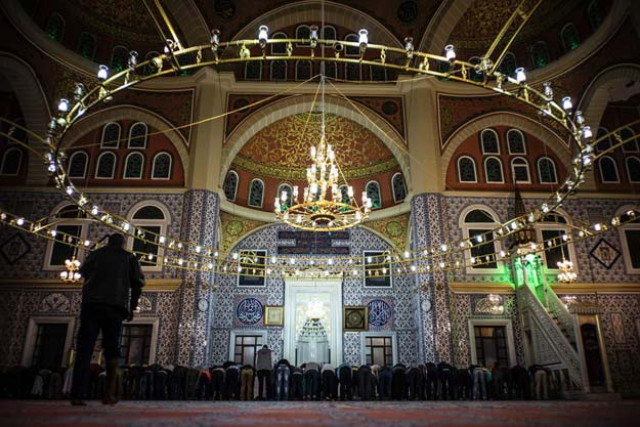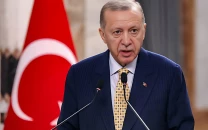Sunni Islam riven anew by ancient dispute
The exclusion of Salafis at a gathering that sought to define Sunnism has provoked outrage

The exclusion of Salafis at gathering that sought to define Sunni Islam has provoked outrage. STOCK PHOTO.
Clerics from around the world met in August in Grozny to define Sunnism and oppose extremism at a conference hosted by Chechnya's eccentric strongman Ramzan Kadyrov.
The gathering excluded the Salafis, the official school of thought in Saudi Arabia, and was dominated by the Ashaaris, the main school of Sunni theologians elsewhere in the Middle East.
The clerics provoked outrage in Saudi Arabia when they issued a concluding statement defining Sunni theology as Ashaari and Maturidi, a similar school of thought, while not mentioning the Salafis.
Sunni leader defends Saudi hosting of Islam’s holiest sites
The attendance of the Grand Imam of Al-Azhar, the prestigious centre of Islamic learning in Egypt currently being renovated with Saudi funds, only fuelled the row.
"When you hold a conference to discuss who are Sunnis, how do you intentionally ignore a cornerstone of Sunnis, the Salafi and Saudi scholars?" said Saudi journalist Jamal Khashoggi.
It prompted a sarcastic outburst from prominent Saudi cleric Aid al-Qarni on Twitter.
"Oh wonder. The country of the two Holy Sanctuaries (in Mecca and Medina), to which Gabriel descended to the Prophet and his companions, is not Sunni according to the Chechnya conference!" he wrote.
The dispute dates back to the early Muslim centuries between supporters of Ashaarism and Hanbalism, the school of jurisprudence that gave rise to modern day Salafism.
In 11th Century Baghdad, the Hanbalis and Ashaaris clashed outside a mosque, throwing stones at each other. A passerby was killed.
When the vizier, the Caliph's first minister, summoned them to a reconciliation meeting, the chief of the Hanbali faction cut it short.
"These people say I'm an infidel. And we say those who don't share our belief are infidels," he said, according to a history of Hanbalis by medieval scholar Ibn Rajab.
While the argument is ancient, "in the last decade, this is the most prominent example of the most pre-eminent Sunni religious office, the Sheikh al-Azhar, declaring what Sunnism is theologically," said H.A. Hellyer, a senior fellow at the Atlantic Council, referring to the Grand Imam.
Salafis, also identified as Ahl al-Hadith, subscribe to a literal interpretation of Koranic verses and prophetic sayings that describe God as having a hand or a foot. Ashaaris tend to interpret them metaphorically.
The Salafis accuse the Ashaaris of denying God's attributes and the Ashaaris in turn accuse the Salafis of likening God to his creation by insisting he has a hand.
The statement did mention Hanbalis, but merely as a school of Islamic law rather than the theology that has historically been associated with it.
As the controversy grew, Kuwaiti Salafi preacher Naif al-Ajami uploaded a video on YouTube denouncing the conference.
"The people who most deserve the title of Sunni are the Ahl Al-Hadith, known today as the Salafis," he said.
Another prominent Saudi cleric, Salman al-Oudah, took to Snapchat to criticise the conference.
After the backlash, the conference statement was amended to include mention of "Ahl al-Hadith" as Sunnis.
Habib Ali Jifri, a popular Yemeni cleric who helped organise the conference, denied that it meant to exclude Salafis.
"When the conference organisers saw the lies that it excluded Ahl al-Hadith from being Sunnis, it included them along with the Ashaaris and Maturidis," he told AFP in an email.
But debate over the conference also assumed a political tone.
"It's a political issue: it's a political conference to marginalise militant forces," Khashoggi told AFP.
The choice of venue exacerbated the controversy, said Hellyer.
Iran executes 20 Sunni 'terrorists' in one day: state media
Kadyrov is often criticised for human rights abuses. He is also viewed as a proxy of Russia, which is propping Syrian leader Bashar al Assad's regime against Saudi-backed rebels.
"The conference's conclusions were essentially theological -- however the location of the conference resulted in political reactions, owing to Kadyrov's political alignments," Hellyer told AFP.
Both Salafi and Ashaari scholars may support their rulers, or oppose them.
But in the Middle East, the preeminent Ashaari and Maturidi clerics of the past century have been seen as close to their governments.
Salafis -- such as Saudi Arabia's clergy -- can also be supportive of governments, but militants such as those of al Qaeda share their theology.
Jifri said he had no qualms about Kadyrov's sponsorship of the conference.
"Chechnya and Caucasus republics have been through a tragedy, partly caused by the takfiri extremists who kill people in the name of Sunnis," he added.


1725099588-0/BeFunky-(41)1725099588-0-208x130.webp)
















COMMENTS
Comments are moderated and generally will be posted if they are on-topic and not abusive.
For more information, please see our Comments FAQ